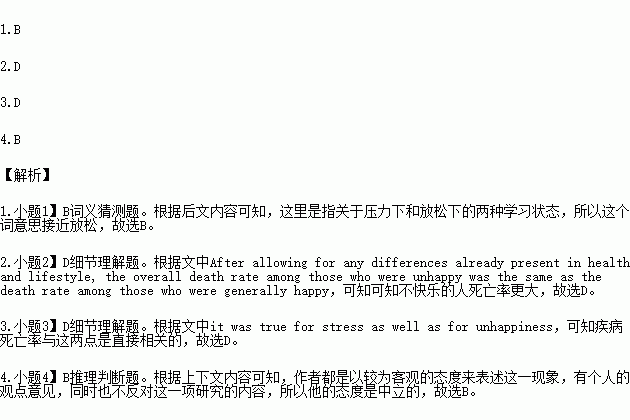题目内容
A study of a million UK women, published today in The Lancet, has shown that happiness itself has no direct effect on mortality, and that the widespread but mistaken belief that unhappiness and stress directly cause ill health came from studies that had simply confused cause and effect. Life-threatening poor health can cause unhappiness, and for this reason unhappiness is associated with increased mortality. In addition, smokers tend to be unhappier than non-smokers. However, after taking account of previous ill health, smoking, and other lifestyle and socio-economic factors, the investigators found that unhappiness itself was no longer associated with increased mortality.
The lead author, Dr Bette Liu, now at the University of New South Wales, Australia said: "Illness makes you unhappy, but unhappiness itself doesn't make you ill. We found no direct effect of unhappiness or stress on mortality, even in a ten-year study of a million women."
As in other studies, unhappiness was associated with deprivation, smoking, lack of exercise, and not living with a partner. The strongest associations, however, were that the women who were already in poor health tended to say that they were unhappy, stressed, not in control, and not relaxed.
The main analyses included 700 000 women, average age 59 years, and over the next 10 years these women were followed by electronic record linkage for mortality, during which time 30 000 of the women died.
After allowing for any differences already present in health and lifestyle, the overall death rate among those who were unhappy was the same as the death rate among those who were generally happy. The study is so large that it rules out unhappiness being a direct cause of any material increase in overall mortality in women.
This was true for overall mortality, for cancer mortality, and for heart disease mortality, and it was true for stress as well as for unhappiness.
1. The word “mortality” in the passage means .
A. richness B. relaxation
C. death D. morality
2. According to the passage, which of the following statements is true?
A. Unhappiness will definitely make a person ill.
B. Unhappiness doesn’t necessarily make you ill.
C. Unhappiness is not associated with lack of exercise.
D. The death rate among those unhappy people is greater.
3.It’s wrongly believed that ________.
A. unhappiness itself is not associated with increased mortality
B. there is no direct link between unhappiness and mortality
C. ill health directly causes unhappiness and stress
D. ill health directly results from unhappiness and stress
4.The writer’s attitude towards the result of the study is __________.
A. disappointing B. indifferent
C. subjective D. objective
 小学课时作业全通练案系列答案
小学课时作业全通练案系列答案 金版课堂课时训练系列答案
金版课堂课时训练系列答案 单元全能练考卷系列答案
单元全能练考卷系列答案 新黄冈兵法密卷系列答案
新黄冈兵法密卷系列答案

 ), 并在其下面写出改加的词。删除:把多余的词用斜线(\)划掉。修改:在错的词下划一横线,并在改词下面写出修改后的词。注意:
), 并在其下面写出改加的词。删除:把多余的词用斜线(\)划掉。修改:在错的词下划一横线,并在改词下面写出修改后的词。注意: